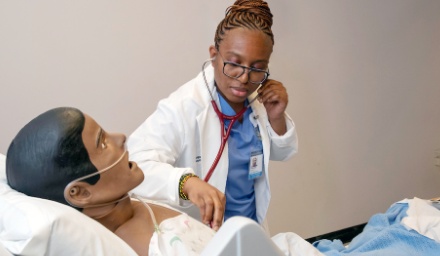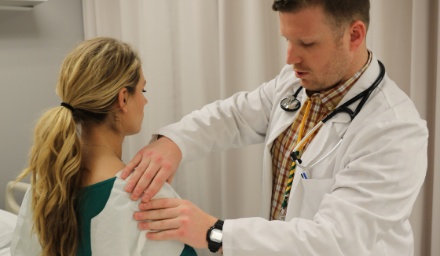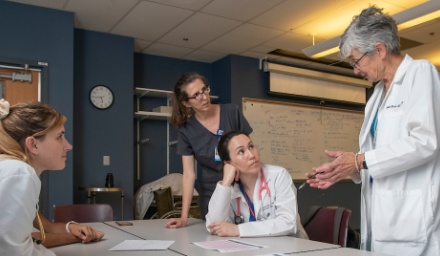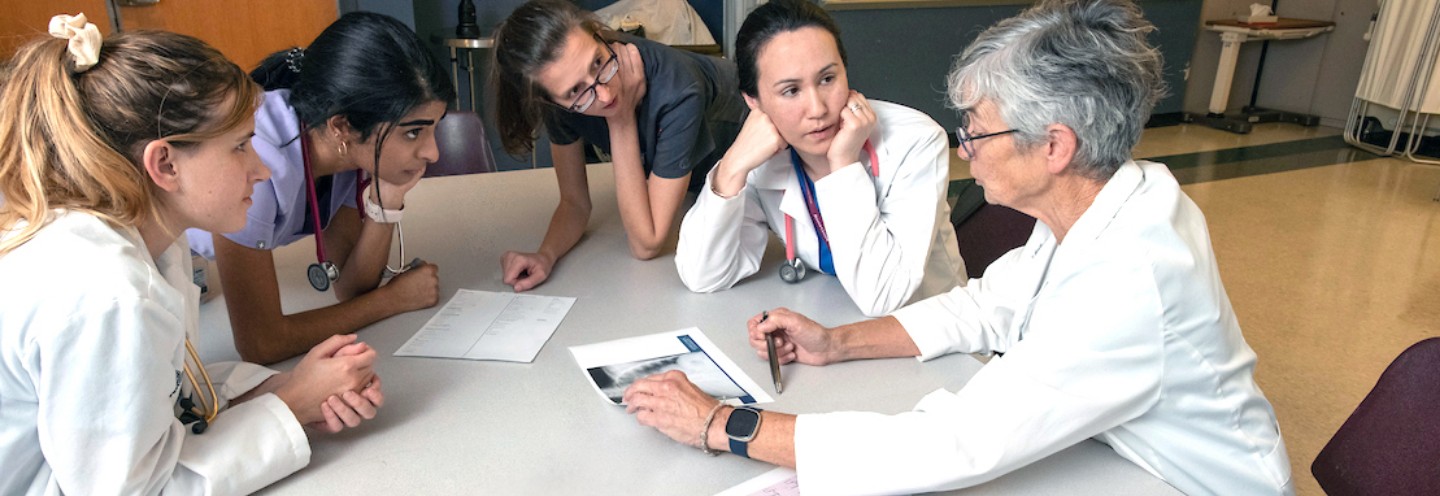Advance Your Nursing Career Through Georgetown University’s Online DNP ProgramsAdvance Your Nursing Career Through Georgetown University’s Online DNP ProgramsAdvance Your Nursing Career Through Georgetown University’s Online DNP Programs
Earn Your BSN to DNP Online or Your Post-Master’s DNP OnlineEarn Your BSN to DNP Online or Your Post-Master’s DNP OnlineEarn Your BSN to DNP Online or Your Post-Master’s DNP Online
DNP Program Overview
Georgetown University School of Nursing’s CCNE-accredited distance-based, online Doctor of Nursing Practice (DNP) programs integrate advanced nursing science with organizational leadership and ethics to prepare you to improve patient care delivery in an increasingly complex health care system.
Georgetown University School of Nursing is a nationally recognized nursing school committed to advancing health equity and improving population health around the world. In keeping with this mission, our distance-based, online DNP programs focus on ethical leadership and prepare you to improve accessibility and quality of care for underserved populations.
As a DNP student, you will have opportunities to visit our campus, located in vibrant Washington, DC, where you can make connections, engage in service, and learn about policymaking as you prepare to lead developments across the health system.
We offer two entry points for our DNP programs:
- BSN to DNP, designed for RNs with a Bachelor of Science in Nursing
- Post-Master’s DNP, designed for APRNs or nurses employed in advanced nursing roles with a master’s degree
I have my BSN and am looking to obtain a DNP
I have my MS in Nursing and am looking to obtain a DNP
BSN to DNP Program
69–74
credits
2–3
Objective Clinical Intensives
1,000–1,200
clinical hours
33
months to complete
This program is designed for registered nurses (RNs) with a Bachelor of Science in Nursing (BSN).
The BSN to DNP program is offered full time and part time. The full-time program can be completed in as few as 33 months and consists of eight 15-week terms. The part-time program consists of eleven 15-week terms. Both schedules include in-person experiences.
The number of program credits depends on the specialization you choose. You will complete both master’s- and doctoral-level coursework while preparing to pursue APRN certification in one of the following specializations:
- Adult Gerontology Acute Care Nurse Practitioner (AG-ACNP): Gain the high-level experience to manage critical issues of patient safety and quality of care in acute and complex care settings.
- Family Nurse Practitioner (FNP): Develop excellent skills in family practice and clinical care environments.
- Dual Nurse-Midwifery/Women’s Health Nurse Practitioner (NM/WHNP): Implement care models that provide the highest quality care to individuals across the life-span and newborns.
- Women’s Health Nurse Practitioner (WHNP): Advocate for individuals across the life span, providing person-focused care and improving care delivery throughout the health system.
Upon graduation, graduates will be eligible to sit for board certification examinations in your specialty area to obtain licensure.

Objective Clinical Intensives
Students in the BSN to DNP program, will attend Objective Clinical Intensives (OCIs), which are academic visits that include working with standardized patients (SP) and genitourinary teaching associates (GUTA). Students will engage in high-fidelity simulation and refine clinical and leadership techniques.

Clinical Placements
BSN to DNP students will gain direct experience treating patients in clinical placements, which are supervised by a skilled nurse preceptor. Our clinical placement team partners with students to secure sites that meet Georgetown University School of Nursing faculty standards, align with the specialization, and fall within a reasonable distance of their community.1
Post-Master’s DNP Program
30
credits
1-2
on-campus executive sessions
250+
practice hours
20
months to complete
The Post-Master’s DNP program is designed to build on the clinical experience of nurses in advanced nursing roles with master’s degrees. Students will engage with a diverse group of students, including health care administrators, nurse informaticists, APRNs, and nurses in a variety of other advanced roles.
The Post-Master’s DNP program is offered in a part-time program of study, consisting of five 15-week terms, as well as DNP practice hours and on-campus executive sessions.
The 30-credit curriculum focuses on leadership at the systems level. Coursework is designed to encourage you to innovate, influence health care policy, and engage in the world in service to others, addressing topics such as:
- Implementing quality and safety initiatives to improve outcomes
- Integrating economic and financial principles in practice
- Evaluating ethical and legal challenges in health care
This program is intended for students who have an advanced nursing specialty or role and does not provide clinical preparation in an area of specialization. If you are interested in pursuing additional certifications, Georgetown University offers an online Post-Graduate Certificate program with four APRN specialization options.
“Working with my Cohort and nationally recognized faculty leaders challenged me to think differently than I had in the past. This has allowed me to create immediate change in my leadership skills and take on new leadership roles that I might not have considered in reach previously.”
– Shaunagh Browning, Post-Master’s DNP 2019 Graduate,
Senior Director, Office of Human Subject Protections
On-Campus Executive Sessions
Support and community are essential to success in a graduate program. As a Post-Master’s DNP student, you will attend one to two on-campus executive sessions, where you will bond with your cohort, practice stress management and mindfulness, and hone your scholarly writing skills.
These sessions include writing boot camps, an introduction to the university and the DC area, opportunities to receive feedback on your AACN graduate level scholarly project, and activities to increase competencies in the DNP essentials.
How the DNP Curriculum Prepares You to Lead
The Doctor of Nursing Practice distance-based, online DNP programs synthesize advanced leadership concepts and clinical expertise to equip nurses employed in advanced nursing roles with the foresight and experience to lead the advancement and implementation of change in health care.
Our programs prepare you to improve health outcomes in the clinical setting, implement systems-level change, and advocate for policies that improve population health, focusing on vulnerable communities.

Advanced Coursework
Through HD-streaming, live distance-based online classes and interactive course content, you will acquire expertise in areas such as:
- Organizational theory
- Health policy and advocacy
- Health care quality and safety
- Economics and finances
- Biostatistics and epidemiology
- Ethical leadership
- Scholarly writing
- Evidence-based practice
- Health care informatics

Doctoral Scholarly Project
You will complete a scholarly project that translates evidence from original research and accelerates the adoption of best clinical and leadership practices.
By implementing and evaluating your DNP scholarly project, you will demonstrate practice-related scholarship, change leadership, and outcomes measurement. Though not required, many DNP students complete projects that support Georgetown University’s Jesuit values and address an existing need of underserved populations in the United States.
Jump to:
BSN to DNP
Post-Master’s DNP
Curriculum
Why Our DNP?
A Faculty of Active Practitioners
You will grow as a leader under the attentive guidance of Georgetown University School of Nursing faculty, who are fellows, active clinicians, and innovators in health care. Inside and outside of the classroom, they will share their knowledge gained from decades of multidisciplinary, real-world practice and experience.
Georgetown University School of Nursing faculty lead all aspects of course delivery, including designing the curriculum; teaching the most current research and techniques; and monitoring on-campus experiences, clinical placements, and DNP scholarly projects.

“Georgetown University’s DNP programs follow the philosophy of leading from where you are. We move our students into a higher level of practice, regardless of a student’s level of experience.”
– Peggy Slota, DNP, RN, FAAN, Director of DNP Graduate Studies
Start Leading Systemic Change
If you are ready to take the next step toward becoming a nursing leader, request information about
our distance-based, online DNP programs today.
Why Pursue Your DNP From Georgetown University?
With a DNP degree from Georgetown University School of Nursing, you will:
- Strengthen your understanding of how health care stakeholders interact as you work to improve collaboration among providers, agencies, and organizations.
- Contribute to enhanced outcomes for the teams and organizations you serve by improving how they function.
- Form partnerships with patients, encouraging them to communicate effectively with their providers and become active participants in their care.
- Develop a deeper understanding of individuals, families, and communities, using this knowledge to advocate for health policy and change.
Frequently Asked Questions
Find answers to commonly asked questions about Georgetown University’s online Doctor of Nursing Practice (DNP) programs.
-
If you don’t already hold a graduate degree in nursing, a DNP program enables you to combine master’s- and doctoral-level coursework; prepares you for certification examination to become an APRN; and equips you with the clinical knowledge you need to provide primary, acute, and specialty care in your specialization.
-
No. A DNP is a Doctor of Nursing Practice degree, whereas nurse practitioner (NP) is a professional job title requiring a degree and certification. Many DNP students are already licensed RNs and board-certified NPs. These students often enter DNP programs to prepare for advanced leadership roles in their organizations.
-
The DNP is a terminal degree which, on its own, does not grant authority to write prescriptions. Board-certified NPs can prescribe medication in certain states; however, an NP’s scope of practice is determined by state regulatory bodies, not degree-granting institutions.
-
A DNP-educated nurse may use the academic title “Dr.” Many choose to clarify their position in a clinical setting where “Dr.” commonly denotes a physician, often listing “DNP” after their name instead, and some states have strict legislation surrounding where and when a nurse may be referred to as “doctor.”
-
It depends on your experience level and your preferred learning modality, specialization area, and pace of study. Many DNP programs offer different paths of study — ranging from one to four years in duration — based on your current credentials, such as an RN license, a BSN, or a master’s in nursing.
-
No. Nurse practitioners (NPs) and medical doctors (MDs) are highly trained professionals with similar responsibilities. However, with residency, it takes an average of 11 years postsecondary education to become an MD. Aspiring NPs may be ready to obtain licensure and begin leading patients’ care with six to eight years of postsecondary education.
Expand Your Impact as a Nurse Leader
Advance your nursing career and influence the health care system by earning your DNP online from Georgetown University.
Request information today.
1 While every effort is made to achieve 100% successful placement, clinical placement is not guaranteed. Some locations may require additional travel time and costs to secure appropriate clinical/practicum placements.




